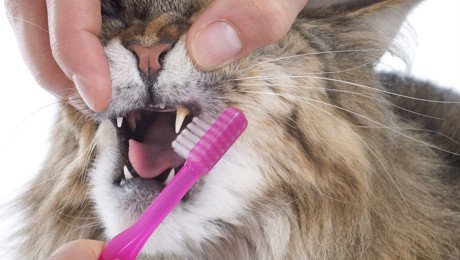How to brush a cat’s teeth

Every cat needs clean, sharp teeth and healthy gums. Damage to the tongue, teeth, palate and gums can lead to many health risks for cats, but these can be prevented with regular veterinary examinations and good old-fashioned tooth-brushing!
Regular brushing of a cat’s teeth can help prevent oral disease that can spread bacteria to other parts of a cat’s body.
What You Need
- A baby toothbrush or pet toothbrush that is an appropriate size for your cat; if your cat won’t tolerate a toothbrush, a small piece of washcloth can be used or an appropriate piece of gauze (such as from a first aid kit) wrapped around your finger
- Pet toothpaste
- Treat or other reward your cat really likes
Note: Do not use human toothpaste or baking soda because these can upset your cat’s stomach. Toothpaste for cats comes in different flavors, like poultry or beef. You may need to try a couple flavors to find the one your cat likes the best. The more your cat likes the toothpaste, the easier it will be brushing.
Technique
Brushing your cat’s teeth should be a bonding experience that is reinforced with praise and rewards. Be very patient — teaching your cat to accept toothbrushing may take a fair amount of time. Make toothbrushing enjoyable for your cat by rewarding him or her immediately after each session.
You only need to brush the outside of your cat’s teeth (the side facing the cheek). Do only as much at a time as your cat allows. You may not be able to do the whole mouth at first.
If you are ever worried about being bitten, stop the toothbrush training and speak with your veterinarian about proper dental care for your cat.
Start by letting your cat get used to the toothbrush and toothpaste. Put them out and let your cat sniff them. You can let your cat taste the toothpaste to see if he or she likes it.
Also, get your cat used to you touching his or her mouth. Lift his or her lips, and slowly and gently rub your cat’s teeth and gums with your finger. You might want to dip your finger in something your cat finds tasty, like the juice from a can of tuna.
When your cat is comfortable with you touching his or her mouth and is familiar with the toothbrush and toothpaste, gradually switch to putting the toothpaste on your finger, and then on the toothbrush. Let your cat lick the paste off the brush at first to get used to having the brush in his or her mouth. If your cat won’t tolerate a toothbrush, a small piece of washcloth or an appropriate piece of gauze (such as from a first aid kit) wrapped around your finger can be used. Place a small amount of toothpaste on the washcloth and rub it over the outside surfaces of your cat’s teeth.
Brush your cat’s teeth along the gumline. Work quickly — you don’t need to scrub. Work up to 30 seconds of brushing for each side of the mouth at least every other day.
If you notice any problems as you brush, like red or bleeding gums or bad breath, please call us. The earlier problems are found, the easier they are to treat.
Info courtesy of DVM360- Behavior (11)
- Caring for your pet (263)
- cat (4)
- Community Events (19)
- dog (6)
- From Our Clients (15)
- Happy Tails (8)
- News (418)
- Press (53)
- Products (2)
- Questions (4)
- Recalls (1)
- Special Offers (5)
- Tips & Advice (231)
- Uncategorized (19)
- Veterinary Services (48)
